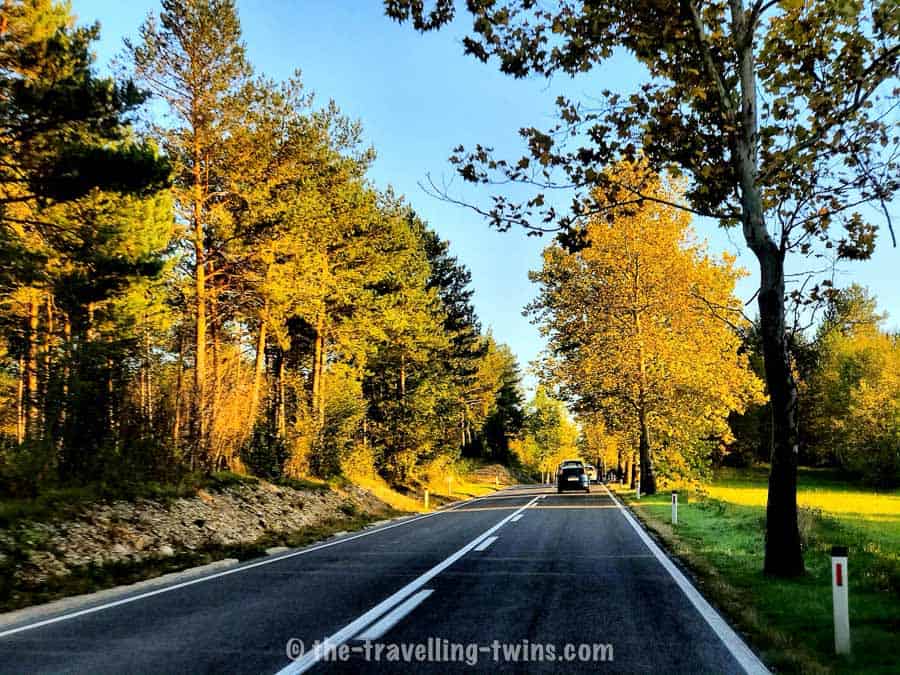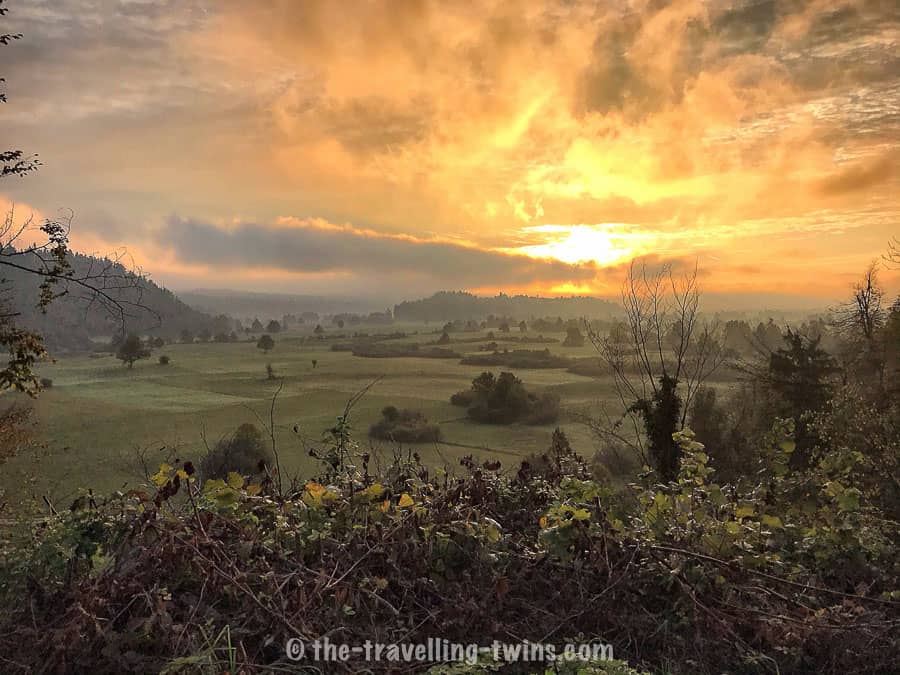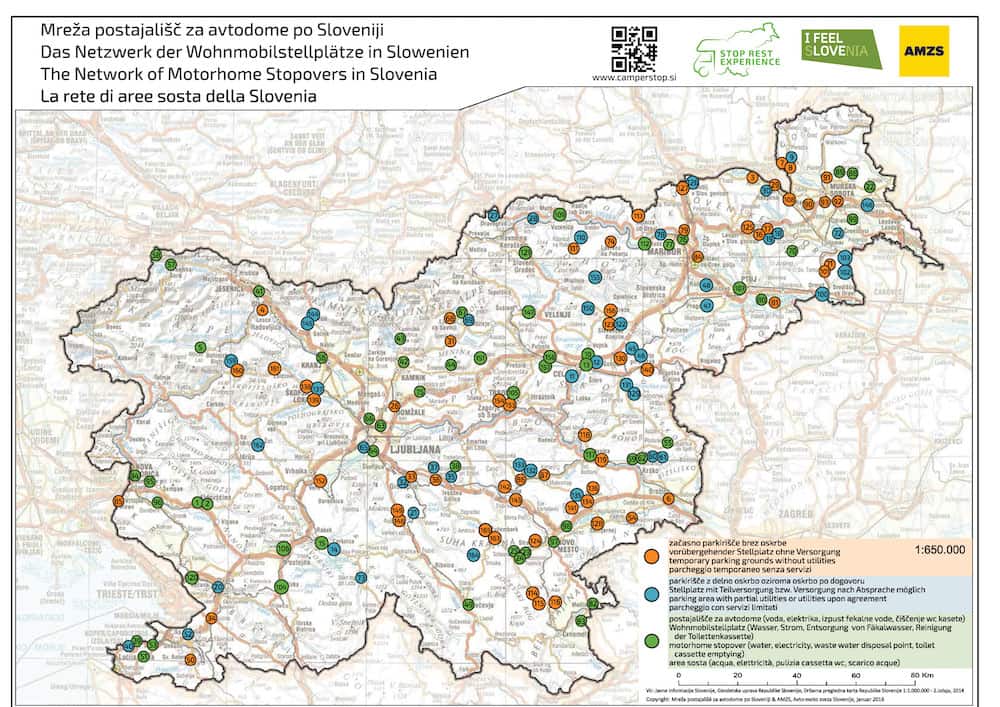
We drove through Slovenia in our campervan with children on our way from Poland to Venice as we had a house-sitting appointment later on in Puglia – the south east of Italy. We planned to spend three days in Slovenia, but loved it so much that we spent seven days going slow and exploring.
So first up, I will give you answers to the “rules-and-regulations” questions I felt that I should research before driving and camping in a new-to-us country. Please do read our disclaimer before taking our advice though. We are not a definitive authority on this stuff.
Driving in Slovenia – Rules and Regulations
Our campervan, like almost all European campers has four wheels and weighs just under 3.5 tonnes. Any advice here relates to vehicles under 3.5 tonnes, because in Europe the rules are different for vehicles over that weight.
Vignette in Slovenia
A vignette is the way most European countries charge private vehicles including foreign vehicles (ours is registered in Poland) for the use of their roads. In Slovenia, vignettes take the form of a windscreen sticker. In some other countries, like Slovakia they are electronic. Spoiler alert – if you stick to small roads in Slovenia, you don’t need one at all . . .
In Slovenia, you need a vignette for any private vehicle (even a motorbike) before you enter either motorways and expressways. An additional toll is payable for the passing the Austrian border at the Karavanke Tunnel.
How much does a vignette cost in Slovenia?
For private 4 wheelers up to 3.5 tonnes a six month vignette costs € 35; a year vignette costs € 55; for motorcycles, the prices are 50%. But… typical camper – even consider to be under 3.5 tonnes cost more because of the height above the axle (don’t ask me what it is lol)
https://www.dars.si/Vignette_system/The_list_of_measured_vehicles
Where do you buy a vignette for Slovenia?
You can buy vignettes at all petrol stations in Slovenia as well as in some petrol stations near borders in neighbouring countries. Some post offices in Slovenia sell vignettes as well.
Do you need a vignette in Slovenia?
Nope you don’t! Hurray!, We were approaching on a small road from Hungary and looking for someone to sell one on our way to the border. No luck. We crossed the border and there within a couple of km was a tourist information place. What a nice man. He didn’t sell Vignettes but his advice to us was to take smaller roads so we wouldn’t need one and he was right.

We told Google Maps to “avoid tolls and motorways” and sure enough, we found ourselves on perfectly good main roads, often going parallel with motorways and adding very little distance to the trip. We felt that the smaller roads which tend to follow valleys and ridges probably had better views too. Or maybe all the views are better when you can feel smug about saving € 30!
Other Traffic rules in Slovenia
Speed limits
- Motorways – 130km/h
- Expressways – 110 km/h
- Rural roads – 90 km/h
- Urban roads – 50 km/h
Insurance
We didn’t check the statutory requirement because we had already made sure our van was covered by our Polish insurance for the whole trip. But if you are hiring a vehicle in one country intending on cross border travel, even in the EU, then, of course, you must advise the hire company of the countries you will be visiting and check that the vehicle is legal, insured and with vignettes for all countries on your route.
Headlamps or driving lights
These must be switched on 24 hours.
More rules for Camper Vans:
Number of passengers is limited to the number of seats. When the vehicle is in motion everyone must be seated.
Roadside rest areas may not be used for overnight stops.
Where to park your camper Overnight in Slovenia
Can you wild camp in Slovenia?
Wild camping is forbidden in Slovenia, but this doesn’t mean you have to use official campsites every night. The trick we think is to avoid the tourist attractions for your stops. Don’t park on the banks of Lake Bled, or outside Postojna cave for example. We stayed in several unassuming places overnight and then left early. Then we would find some more picturesque place for breakfast on our way to the day’s destination. That worked very well.

Where to camp in Slovenia?
In Slovenia, you actually have several options for camping:
- Official camping grounds
- Camp stops on farms or at friendly inns
- Motorhome Rest Areas – Camper Stops
- Regular Parking
Official camping grounds

These have obligatory star categorisation (from 1 to 5). The higher the star the better the accommodation and higher the price. There are lots of expensive 5* camping grounds next towns and tourist attractions. Their prices vary by season but they are quite steep – around € 20 per person. This is much more than we were paying off season last year in the UK or this year in Slovakia for example.
Examples of the official camping grounds – most of the official camping grounds in Slovenia offer Glamping options, as well as small chalets for rent. So if you are exploring Slovania on bike or motorbike they are a great choice. They almost always have the pool facilities (open in the summer) or hot springs pools
- Camping Bled
- Boutique Camp Ljubljana
- Camping Terme 3000
- Soča Camp
- Triglav National Park camping – Kamp Triglav good prices
Camp stops on farms or at friendly inns
This is a super option and an example of how the internet has made travelling so much easier. There are several websites who put farms and camper-friendly inns in touch with road travellers. It’s nice because it gives you an introduction to meet local people and in most cases you can also buy fresh farm produce.
Check the following links:
- Agrocamping – a list of 88 camper-friendly farmhouses,
- Heart of Slovenia
- GoCampr
Motorhome Rest Areas – Camper Stops

The detail list of camper rest areas you will find here
These are designated camper parks often with clean water, and/or electricity, wifi, and/or toilets or water disposal
Mostly they are free or there is a small fee. We stayed in one place like that which we found from this website:
The place was deserted until a very affable guy turned up with his collie dog to chat about life and travel. He wasn’t the owner but the manager and apparently the intention is one day to make this spot a payable campsite but for the time being we stayed for free after a very pleasant chat.
Regular Parking
We spent a few nights on normal parking lots in towns. Mostly because when we finished sightseeing it was already dark and it was easier to stay for a night where we were rather than look for a new place in the dark.
In Ljubljana we stayed for a night on an overnight parking lot in the town centre (google map link) This was cheaper and much closer to the delightful riverside town centre than any camping site.
We also stayed some nights in parking lots near big shopping centres after closing times. We generally left early in the morning.
Note if you are using regular parking, you won’t have mains power points, water or drainage facilities. Depending on the surroundings, you might not want to advertise your presence by opening up windows, cooking outside, etc. So this kind of camping is much easier if your van has a toilet, water tanks, suitable battery for internal lighting, etc – whatever you need to be self sufficient and able to depart without leaving anything but tire tracks.
Where to take clean water and find drainage for campers in Slovenia
You have several options for obtaining clean water for your camper in Slovenia
- Camping site
- Motorhome rest area with water
- Fuel station – most of Slovenian fuel stations have a point with clean water. It’s the same place where you put air to your tires, just a different hose. We were surprised to learn that even where you have to pay for air, the water was often free.
Finding facilities for draining grey water and foul discharge can be harder, but by always being on the lookout for opportunities, we succeeded in getting through the country without leaving any biohazards in our wake.
Some practical thoughts on travelling and staying connected in Slovenia.
European Union
Slovenia is in the EU which means that land travel with all four of its immediate neighbours is across unrestricted borders.
Currency
Slovenia uses the Euro which is the same as its neighbours Austria and Italy. Its other two immediate neighbours, Hungary and Croatia are both in the EU but not the Eurozone.
Food shopping – Supermarket in Slovenia
If you are travelling through Slovenia in a camper you probably prepare your own food. We did. Our favorite shop for quick food shopping was Lidl. They have all the selection of food, including gluten and dairy free. Good selection of cheap wines – Slovenian Wines are very tasty- do try them. And remember to buy and try Slovenian apples – they are delicious.
Navigation
We used Google maps and it worked fine. The “Avoid motorways and tolls” option worked too as we were driving without a vignette. You can download offline maps or stay on line. However one of the nice things about Google maps is even without a downloaded map, once you have started the journey you can switch off data on your phone and the navigation still works . . . so long as you stay on the route(!)
Power
Like all of Europe, Slovenia uses two pin plugs at 220-240 volts – but be aware that the “standard” European two pin socket is significantly different in some European countries as we discovered when we took some powered appliances with us from Poland to Hungary once and our Polish plugs didn’t fit in the Hungarian sockets. The good news is that most international power adapters you buy in airports for example are compatible with all variants of European sockets.
Data
We have Polish SIM cards and are on (Orange) packages which give us very cheap roaming data within the EU. This worked fine in Slovenia. We also have a mobile data wifi hotspot called a KeepGo which is good for emergencies. You can read about it here
When to go camping in Slovenia
Official Campgrounds are usually open from the beginning of April to the end of September or mid-October. There are some open the whole year – mostly one next to Terms (hot springs).
We were Camping in Slovenia in October and we had to switch on the gas heating a few times at night. Winters in Slovenia can be cold and November rainy so I would think that the best time is Mid March to the end of October
CamperVan hire in Slovenia
If you don’t have a camper and still want to explore Slovenia by camper which I believe is the best way to see Slovenia. You can hire one. Below a few camper rental places in Slovenia.
- Spicy Campers – small campers
- Balkan Campers – retro campers, full insurance
- Vanvoyage – campers for 2 and 4 people
- Slovenia Camper – selection of standard motorhomes and luxury family RV
- Marley Campervan – cool small VW capers
Slovenia is a beautiful country with lots to see. Even after a very happy week there, we still haven’t seen all the sights. For sure, we will be going back.
Camping in Slovenia – share it, Pin it for later

Privacy Policy Disclaimer
This website uses affiliate links for income and support.
If you like our website, please consider using these links. You will be directed to the vendor, and we will get a small commission on your purchase price at no increased cost to you.
We have researched facts stated here as far as practicable but please check anything critical before committing your time and money. We do not claim any special knowledge or expertise, and we are not consultants for our readers.